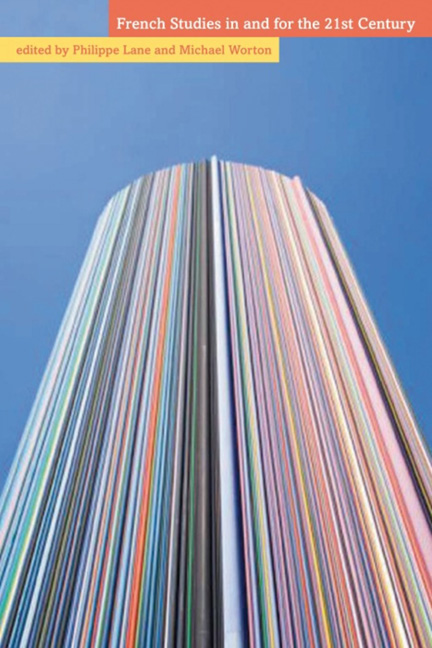Book contents
- Frontmatter
- Contents
- Notes on Contributors
- Foreword
- Foreword by His Excellency
- Part I: Contextualisations
- Part II: Research and Public Engagement Strategies
- Part III: The Place of Women and Gender in French Studies
- 6 Gender and the French Language: The longue durée of French Studies in the UK
- 7 Contemporary Women's Writing in French: Future Perspectives in Formal and Informal Research Networks
- 8 French Studies and Discourses of Sexuality
- Part IV: The Place of Literature
- Part V: The Place of Linguistics in French Studies Today
- Part VI: Theatre, Cinema and Popular Culture
- Part VII: Area Studies, Postcolonial Studies and War and Culture Studies
- Part VIII: Adventures in Language Teaching
- Appendices. Addresses to the Future of French Studies Conference
8 - French Studies and Discourses of Sexuality
from Part III: The Place of Women and Gender in French Studies
- Frontmatter
- Contents
- Notes on Contributors
- Foreword
- Foreword by His Excellency
- Part I: Contextualisations
- Part II: Research and Public Engagement Strategies
- Part III: The Place of Women and Gender in French Studies
- 6 Gender and the French Language: The longue durée of French Studies in the UK
- 7 Contemporary Women's Writing in French: Future Perspectives in Formal and Informal Research Networks
- 8 French Studies and Discourses of Sexuality
- Part IV: The Place of Literature
- Part V: The Place of Linguistics in French Studies Today
- Part VI: Theatre, Cinema and Popular Culture
- Part VII: Area Studies, Postcolonial Studies and War and Culture Studies
- Part VIII: Adventures in Language Teaching
- Appendices. Addresses to the Future of French Studies Conference
Summary
In his scintillating volume, Freud, Proust and Lacan: Theory as Fiction, Malcolm Bowie writes of the ‘profoundly unsettling view of human sexuality enshrined’ in the later volumes of A la recherche du temps perdu. Bowie writes wonderfully about the narrator's attachment to Albertine:
The asking of questions about Albertine – has she had lesbian relationships in the past? is she having, or contriving to have, such relationships now? how can truth be distinguished from falsehood in Albertine's reports on her actions and feelings? – is presented as one of the narrator's inescapable emotional needs. His mind comes to specialise ever more devotedly in the production and transformation of anxiety, and in the telling of tactical lies designed to surprise Albertine into self-disclosure.
Bowie traces the relation between interpretation and desire in this long novel, responding to the two as interminable, and infinitely involved with one another. Looking beyond previous critical attempts to locate Albertine and define her sexuality, Bowie reminds us that ‘Albertine's sexuality remains an enigma’. He continues: ‘Albertine cannot be known, unless this interminable passage from structure to structure is itself knowledge and our other notions of what it is to know are the products of a lingering infantile wish for comfort or mastery.’
It has now long been recognised that literary and cultural studies in France have felt the impact of queer studies and of theoretical investigations of gender, pursued in the USA and UK, only latterly. Judith Butler's paradigm-shifting Gender Trouble: Feminism and the Subversion of Identity (1990) was only published in France in 2005. Subsequently, translations of her works have appeared much more rapidly and Butler has been invited to give prestigious lectures in France (for example at the Ecole des Hautes Etudes en Sciences Sociales and the Ecole Normale Supérieure in 2009). For la rentrée 2010, Le Monde carried an article on the new compulsory teaching of queer studies at Sciences Po, suggesting at once how far such discourses are now recognised within the academy in France and also how far this is still so novel as to be remarked on in the media.
- Type
- Chapter
- Information
- French Studies in and for the 21st Century , pp. 95 - 104Publisher: Liverpool University PressPrint publication year: 2011



